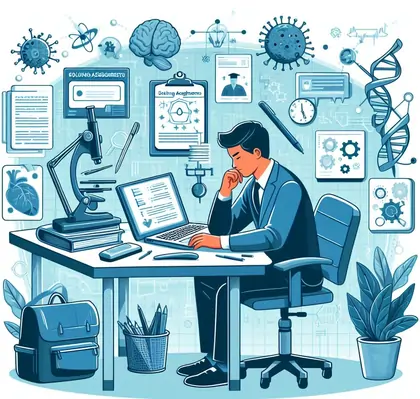Biotechnology in Action: Solving Assignments in Cutting-Edge Biology

In the rapidly advancing field of biology, biotechnology plays a pivotal role in unravelling the mysteries of life and pushing the boundaries of scientific discovery. This blog explores how biotechnology is actively employed in tackling challenges within cutting-edge biology, showcasing its transformative impact on research, medicine, and beyond, including its utilization to solve your Biology assignment.
In the dynamic landscape of biological sciences, the fusion of biology and technology, aptly named biotechnology, is catalysing a profound revolution. This blog embarks on a journey through the corridors of scientific inquiry to explore how biotechnology is not merely a theoretical construct but a vibrant force actively engaged in solving assignments in cutting-edge biology. As we peer into this world of innovation, we witness how biotechnology, with its array of powerful tools and techniques, is shaping the future of scientific discovery, medical breakthroughs, and sustainable agriculture.
Biotechnology is the marriage of biology, chemistry, and technology, unlocking the intricacies of life and offering solutions to some of the most pressing challenges facing humanity. Its multifaceted applications span a wide spectrum, from unraveling the mysteries of the genetic code to engineering microorganisms for industrial processes. It is within this amalgamation of disciplines that the true power of biotechnology becomes evident—a force propelling us towards a future where the boundaries of what is possible are continually expanded.

The heart of this exploration lies in understanding how biotechnology actively contributes to solving assignments in cutting-edge biology. No longer confined to the confines of laboratory benches, biotechnology is a dynamic force reshaping the landscape of scientific research. In the following sections, we will journey through two pivotal realms where biotechnology is leaving an indelible mark: Genetic Engineering in Medicine and Agricultural Biotechnology. Each of these subtopics unveils a unique facet of biotechnological applications, demonstrating its role as a catalyst for transformative change.
The genetic revolution is upon us, and at the forefront stands the groundbreaking CRISPR-Cas9 technology. Often hailed as the "molecular scissors" of the biological world, CRISPR enables precise editing of genes, unlocking the potential to correct genetic defects and revolutionize medical treatments. As we dive into the realm of genetic engineering, the inner topic of CRISPR-Cas9 and Precision Medicine will shed light on how this technology is shaping the future of personalized therapies, gene editing, and our understanding of the genetic basis of diseases.
Beyond the confines of the laboratory, biotechnology extends its influence to the fields and farms that feed our growing global population. Agricultural biotechnology, with its flagship in Genetically Modified Organisms (GMOs), emerges as a powerful tool to address the challenges of food security and sustainable agriculture. In this journey, we will explore the inner topic of GMOs and Crop Improvement, unveiling how biotechnology is contributing to the development of crops with enhanced yield, resistance to pests, and adaptability to diverse environmental conditions.
Genetic Engineering Revolutionizing Medicine
In the vast realm of biotechnology, one of the most captivating chapters unfolds within the domain of genetic engineering, where revolutionary breakthroughs are reshaping the landscape of modern medicine. At the forefront of this transformative wave stands the remarkable CRISPR-Cas9 technology, often heralded as the "molecular scissors" of genetic manipulation. This section delves into the profound impact of genetic engineering on medicine, highlighting the unprecedented possibilities it brings to the diagnosis, treatment, and prevention of diseases.
CRISPR-Cas9, a groundbreaking genome-editing tool, has catalyzed a paradigm shift in how we approach genetic disorders. This precision-guided technology allows scientists to modify specific DNA sequences with unparalleled accuracy, opening avenues for targeted interventions in the human genome. As we navigate the intricate world of CRISPR, we discover its role in the customization of medical treatments—ushering in the era of precision medicine.
Precision medicine, a cornerstone of genetic engineering in medicine, embodies the concept of tailoring medical interventions to the individual characteristics of each patient. CRISPR-Cas9 facilitates the correction of genetic mutations that underlie various diseases, paving the way for personalized therapies that were once relegated to the realm of science fiction. The inner topic of CRISPR-Cas9 and Precision Medicine within this section unravels specific instances where this technology has been successfully applied, showcasing its potential to revolutionize the treatment landscape for genetic disorders.
Beyond correcting genetic anomalies, CRISPR-Cas9 plays a pivotal role in unlocking the mysteries of disease pathways and molecular mechanisms. Researchers employ this technology to create precise cellular and animal models, providing invaluable insights into the fundamental biology of various conditions. This deeper understanding of diseases at the genetic level not only facilitates the development of targeted therapies but also opens new avenues for early detection and prevention.
CRISPR-Cas9 and Precision Medicine
Genetic engineering has emerged as a game-changer in the medical realm, offering unprecedented opportunities for targeted interventions. The revolutionary CRISPR-Cas9 technology, often referred to as the "molecular scissors," allows scientists to precisely edit genes with unparalleled accuracy. In this section, we delve into how CRISPR is transforming medicine by enabling the development of personalized therapies, gene therapies, and even potential cures for genetic disorders. The inner topic explores specific examples where CRISPR has been applied successfully, emphasizing its role in the future of precision medicine.
- Precision Genome Editing Unleashed
- Exploring Precision Medicine Horizons
At the forefront of genetic engineering, CRISPR-Cas9 emerges as a revolutionary tool, akin to precision genome editing. This subtopic unveils the transformative power of CRISPR-Cas9 in shaping the landscape of precision medicine, where the genetic code becomes a malleable entity, allowing scientists to edit, modify, and even rewrite specific DNA sequences with unprecedented accuracy.
CRISPR-Cas9 operates like molecular scissors, capable of precisely targeting and cutting DNA at designated locations. This level of precision enables scientists to edit genes with unparalleled accuracy, opening new vistas in the realm of precision medicine. Unlike conventional treatments that offer broad interventions, precision medicine seeks to tailor medical approaches to individual genetic profiles. CRISPR-Cas9, with its ability to target specific genes associated with diseases, serves as the quintessential tool for achieving this level of customization.
Delving into precision medicine, this section elucidates how CRISPR-Cas9 is reshaping therapeutic strategies for a myriad of genetic disorders. By targeting and correcting specific genetic mutations responsible for diseases, CRISPR-Cas9 holds the promise of transforming the treatment landscape. From hereditary conditions to certain types of cancers, this precision-guided tool offers hope for highly effective, personalized therapies.
The subtopic further explores ongoing research and clinical trials where CRISPR-Cas9 is being applied to treat genetic diseases at their root, potentially offering cures rather than symptomatic relief. Additionally, it sheds light on the ethical considerations and challenges associated with wielding such precise genetic manipulation tools in the context of human health. As we unravel the subtopic of "Precision Genome Editing Unleashed," the intersection of CRISPR-Cas9 and precision medicine unfolds as a dynamic frontier, promising a future where medical interventions are as unique as the individual genetic codes they aim to correct.
Agricultural Biotechnology: Feeding the World Sustainably
In the quest for sustainable solutions to address the growing global population's nutritional needs, agricultural biotechnology emerges as a beacon of innovation. This section illuminates the transformative role of biotechnology in agriculture, focusing on how it tackles the challenges of food security, environmental sustainability, and the efficient use of resources.
At the heart of this agricultural revolution lies the concept of Genetic Modified Organisms (GMOs), where biotechnology is applied to enhance the genetic makeup of crops. The section navigates through the intricate world of GMOs, exploring their impact on crop improvement and the broader context of sustainable agriculture.
GMOs, created through genetic engineering techniques, possess traits that are tailored to address specific challenges faced by crops. Whether it's resistance to pests, tolerance to harsh environmental conditions, or increased nutritional content, GMOs represent a powerful tool to enhance crop performance. The inner topic of GMOs and Crop Improvement delves into specific instances where biotechnology has successfully engineered crops to withstand diseases, pests, and environmental stressors, showcasing the practical applications of these advancements in agriculture.
The implications of agricultural biotechnology extend far beyond the laboratory and into the fields, where farmers grapple with the demands of feeding a growing population amidst changing climatic conditions. Biotechnology equips them with tools to optimize yield, reduce dependence on chemical inputs, and minimize the environmental impact of agriculture.
Sustainability lies at the core of agricultural biotechnology's mission. By creating crops that require fewer pesticides, fertilizers, and resources, biotechnology contributes to environmentally friendly farming practices. The section explores how these innovations not only enhance productivity but also promote ecosystem health and resilience.
Furthermore, the narrative unfolds in the context of a global agricultural landscape where traditional methods may struggle to meet the demands of an ever-expanding population. Agricultural biotechnology becomes a crucial ally in ensuring food security by providing a means to produce more with less, fostering resilience against climate change, and mitigating the ecological footprint of farming practices.
Genetically Modified Organisms (GMOs) and Crop Improvement
Biotechnology isn't confined to the realm of medicine; it also plays a crucial role in addressing global challenges, such as food security and sustainability. Genetically Modified Organisms (GMOs) have become a focal point in agricultural biotechnology, offering solutions to enhance crop yield, resist pests, and adapt to changing environmental conditions. This section delves into the world of agricultural biotechnology, exploring the science behind GMOs and their impact on sustainable agriculture. The inner topic examines specific instances where GMOs have proven beneficial in improving crop resilience and increasing agricultural productivity.
- Tailoring Crops for Tomorrow
- Engineering Traits for Resilience
- Precision in Agriculture: The GMO Advantage
- Balancing Innovation and Concerns
In the ever-evolving landscape of agricultural biotechnology, the spotlight shines brightly on Genetically Modified Organisms (GMOs), heralding a new era of crop improvement. This subtopic navigates through the intricate world of GMOs, showcasing how genetic engineering techniques are employed to enhance the genetic makeup of crops, creating resilient, high-yielding varieties poised to address the challenges of modern agriculture.
GMOs represent crops that undergo intentional genetic alterations, endowing them with specific traits tailored to combat prevalent challenges. This subtopic unravels the genetic intricacies involved in engineering crops for resilience against pests, diseases, and environmental stressors. By introducing genes that confer resistance or tolerance, scientists can bolster crop defenses and minimize yield losses, contributing to global food security.
Exploring the inner topic of GMOs and Crop Improvement, we delve into real-world applications where biotechnology has successfully optimized crops for sustainable agriculture. From drought-resistant crops that thrive in water-scarce regions to plants engineered to resist specific pests, GMOs exemplify precision in agricultural practices. The section highlights how these genetically tailored crops not only enhance yield but also reduce the need for chemical inputs, fostering environmentally conscious farming practices.
The subtopic also delves into the discourse surrounding GMOs, acknowledging concerns about environmental impact, biodiversity, and consumer safety. As we navigate through the complexities of balancing innovation with ethical considerations, the discussion reflects the ongoing dialogue in agricultural biotechnology.
Conclusion:
Biotechnology stands at the forefront of scientific innovation, influencing every facet of modern biology. From the precision of CRISPR-Cas9 in medicine to the sustainable solutions offered by GMOs in agriculture, these advancements are not just theoretical concepts but practical tools actively shaping the future.
It unveils the transformative power of biotechnology across two dynamic landscapes: Genetic Engineering in Medicine and Agricultural Biotechnology. From the precision-guided molecular scissors of CRISPR-Cas9 revolutionizing personalized medicine to the tailored resilience of Genetically Modified Organisms (GMOs) ushering in sustainable agriculture, the impact is profound.
As we conclude this journey, it's evident that biotechnology is not merely an abstract concept but a tangible force actively shaping the future of biology. The assignments once deemed insurmountable are now met with precision, innovation, and a commitment to sustainability. The narrative of precision medicine and genetically tailored crops reflects a dynamic synergy between biology and technology, pushing the boundaries of what is achievable.